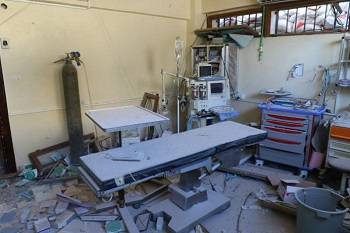Syrian regime forces and allied fighters advanced further into opposition-held Aleppo on Monday, pressing an offensive in defiance of international concern for the fate of the city and its beleaguered civilians.
"At least 36 people were killed in Monday's bombing," rescue worker Ibrahim Abu Leith told Al Jazeera. "These are the most violent attacks we've seen in five years."
The recapture of the opposition-held east, which fell from regime control in 2012, would be the regime's most significant victory since the conflict began more than five years ago.
The international community appeared unlikely to halt the regime's advance, despite expressing outrage over rising civilian deaths and the targeting of hospitals and rescue-worker facilities in the east.
Geert Cappelaere, regional director for the UN's children's agency, said more than 100,000 children were trapped. "Children should not be dying in hospitals because of bombs, and they should not be dying in schools."
Opposition forces have steadily lost ground since Moscow, a key backer of Bashar al-Assad, intervened to bolster his regime last year.
Activists and the UK-based Syrian Observatory for Human Rights said on Monday that regime forces, backed by Iranian and Russian troops and fighters from Lebanon's Hezbollah, captured the eastern part of the Masakan Hanano neighborhood.
"It is the most important advance inside the eastern neighborhoods that the regime has made so far," said Syrian Observatory director Rami Abdel Rahman.
"If they take control of Masakan Hanano, the regime will have line-of-fire control over several opposition-held neighborhoods and will be able to cut off the northern parts of opposition-held Aleppo from the rest of the opposition-held districts."
Abdel Rahman said that the advance had both strategic and symbolic significance, because Masakan Hanano was the first neighborhood to fall to opposition in 2012.
On Sunday, Damascus rebuffed a United Nations truce plan for Aleppo that would see the east of the city temporarily administered by the opposition, saying it would "reward terrorists".
Once Syria's economic powerhouse, Aleppo has been ravaged by the war that began with anti-regime protests in March 2011.
But the UN's Syria envoy has warned that a new assault could spark a fresh humanitarian catastrophe, prompting an exodus among the 250,000 people who remain in the east, trapped under regime siege.
Regime forces have pounded east Aleppo with air strikes, barrel bombs and artillery fire since last Tuesday, in a barrage that has killed more than 375 people in Aleppo city and its surrounding countryside, according to Abu Leith from the first responder group known as the "White Helmets" that operates in opposition-held areas.
No aid has entered the east since regime forces surrounded it in July, prompting severe food and fuel shortages in opposition-held neighborhoods as winter weather begins to set in.
A European diplomat told the AFP news agency that the fall of east Aleppo appeared to be a matter of time.
"Now, it's just a question of how long they can hold on," the diplomat said, speaking on condition of anonymity.
"There is nothing to eat, no more hospitals, and the bombardment is non-stop. They are under very strong pressure."
Backers of the opposition, including Washington, have shown little sign that they will intervene, beyond criticizing Damascus and its allies over civilian casualties.
'Humanitarian catastrophe'
UN humanitarian chief Stephen O'Brien, briefing the UN Security Council on Monday about the situation in Aleppo, said conditions in the opposition-held sector of the city had gone from "terrible to terrifying and are now barely survivable by human beings."
"Let me be clear, we are not just seeing a resumption of violence in Aleppo. This is not business as usual. What has been unleashed on civilians this past week is yet another low in an unrelenting, inhuman onslaught, and it is as heartbreaking as it is not inevitable," said O'Brien.
On Sunday, US President Barack Obama said that he was "not optimistic about the short-term prospects in Syria".
"Once Russia and Iran made a decision to back Assad in a brutal air campaign ... it was very hard to see a way in which even a trained and committed moderate opposition could hold its ground for long periods of time," he said.
PHOTO CAPTION
A damaged operation room is pictured after an airstrike on the opposition-held town of Atareb, in the countryside west of Aleppo, Syria November 15, 2016. REUTERS
Al-Jazeera


 Home
Home Discover Islam
Discover Islam Quran Recitations
Quran Recitations Lectures
Lectures
 Fatwa
Fatwa Articles
Articles Fiqh
Fiqh E-Books
E-Books Boys & Girls
Boys & Girls  Ramadan
Ramadan Fatwa Audios
Fatwa Audios Month of Mercy
Month of Mercy Women
Women Eed Al- Fitr
Eed Al- Fitr Food Recipes
Food Recipes Videos
Videos

 Prayer Times
Prayer Times












